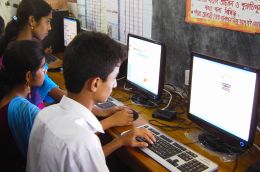Indian schools spur virtual PC demand

INDIA--Bolstered by demand from local educational institutions, U.S.-based NComputing expects its revenues from India to increase from 7 percent today, to 35 percent by the end of 2009.
"In the coming year, we are going to deploy more than 1 million virtual desktops and a large chunk of these will be deployed in India," Stephen Dukker, chairman and CEO of NComputing, said in a phone interview.
 Virtual PCs bring low-cost computing to Indian schools. |
A provider of desktop virtualization software and hardware, NComputing has witnessed rapid growth in India with companies such as NIIT, Maruti Udyog, HCL, Educomp Solutions and the Azim Premji Foundation, buying its virtual desktops. The NComputing offering encompasses virtualization software that enables a single PC to be shared by several users, bringing the cost of acquiring a PC to as low as US$70, according to the company. Since its launch two years back, NComputing has sold nearly 1 million units in over 80 countries.
Dukker said: "Today, 35 percent of our revenues come from the United States, 12 percent from Brazil, 7 percent from Eastern Europe and 7 percent from India. By end-2009, we are expecting our revenues from India to increase to 35 percent."
"We had developed the virtualization solution as a tool for businesses to improve their efficiencies. However, we are seeing rapid embracement of this technology by educational institutions, in both developed and emerging markets," he said. Today, 70 percent of NComputing's revenues come from the education industry.
The U.S. vendor touts its products based on the proliferation of personal computers, where the majority of applications use only a small fraction of available computing capacity. NComputing aims to enable businesses to tap this unused capacity and enable it to be shared simultaneously by multiple users--as many as 30 users to one PC. This, the company said, will substantially lower the cost of infrastructure, installation and maintenance, and allow users to work on different applications at the same time.
NComputing virtual desktops also consume lower power, Dukker said. "Our access devices use only 1 watt of electricity, compared to 89 watts used by a dedicated PC," he said. "This reduces electricity consumption by over 90 percent and is a boon for energy-deficient countries like India. Due to the energy savings, the computers pay for themselves in less than six months."
L. Balasubramanian, president of school learning solutions at NIIT, said in a phone interview: "As opposed to the US$188 OLPC (One Laptop Per Child) XO-1, we found the economic sustainability of the NComputing access devices to be a lot higher. According to Balasubramanium, including hidden costs such as maintenance and support, the OLPC XO-1 will cost US$300.
NIIT uses NComputing's X-Series access devices that run on a US$350 Dell Vostro200 Core2 Duo Processor, which can support seven users at a time.
The X-Series accounts for two-thirds of NComputing's sales, Dukker said, adding that the system runs within 10 meters of the master PC and costs US$70 per unit.
The Azim Premji Foundation, which has deployed virtual PCs in 30 schools, has also created a mobile classroom--built inside a bus--using NComputing products.
The Republic of Macedonia also recently purchased 180,000 L-Series PCs, providing every child in its government school system with computing access at their desk. For the government of Macedonia, maintenance cost is also lower since there are only 25,000 CPUs supporting the 180,000 sets of monitors and keyboards, Dukker said. In addition, should the PCs become obsolete, the government only needs to replace the CPUs.
"Until now, almost 1 billion users around the world who could benefit from access to computing have been unable to afford it," he said. "It is only by fundamentally changing the economics of computing that our industry can bridge the digital divide."
Swati Prasad is a freelance IT writer based in India.